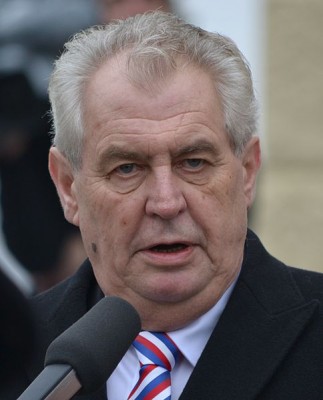The political instability in the Czech Republic has got another dimension. After the decay of leading governmental coalition, early parliamentary election is coming. It is repeating again and again, one could add…
Early parliamentary election in the Czech Republic is scheduled on 25th and 26th October, 2013. The date is seven months before constitutional expiry of the elected parliament’s four-year legislative term. Let’s go through a few facts…
The cause: scandal
The government elected in May 2010, led by Prime Minister Petr Nečas from ODS (en: Civil Democratic Party), was forced to resign on 17th June, 2013, due to a spying, corruption and bribery scandal involving the person of Petr Nečas himself and his closest colleagues (especially his assistant, Jana Nagyová; after that Nečas admitted rumours about their personal relationship). Immediately after the media release, the leading opposition party ČSSD (the Czech Social Democratic Party) demanded that the Chamber of Deputies be dissolved and early election organized as soon as possible, while the recent coalition formed by ODS, TOP09 party and LIDEM party argued they could still hold a majority for governing the country under Miroslava Němcová (ODS) as a hypothetical prime minister and substitution for Petr Nečas. At that time, the government coalition, however, only had 98 seats out of 200 (ODS=50, TOP09=42, LIDEM=6), and was thus also dependent on support from independent MPs. The coalition (logically) assumed independent MPs would support the government because they would like to stay in Parliament till June 2014 (regular election) and charge all benefits (esp. wage) instead of probably losing seats in early election. But…
A new government
The Czech President, Miloš Zeman, decided unprecedentedly not to adhere to any of the political requests, but instead to appoint a caretaker government which he calls “government of experts”. His critics used the term “government of Zeman’s friends”.
The new government has been led by Prime Minister Jiří Rusnok, an economist from private financial sector (ING Pension Fund) and a former member of the National Economic Council (advisory body to former governments of Mirek Topolánek and Petr Nečas). President Zeman declared that if the caretaker government, contrary to his belief, was unable to muster majority support in the constitutionally required vote of confidence, within a minimum of 30 days in office, then he would award a second attempt of government formation to the ODS led coalition, provided it could still submit at least 101 MP signatures of renewed support.
Way to early election
Once again, all expectations changed. The caretaker government narrowly lost a vote of confidence on 7th August, 2013, leading to its resignation six days later. The parliament then – very surprisingly – voted in favour of dissolving itself on 20th August, 2013, with a loud call for early election within 60 days after presidential assent.
Eventually, the president gave his assent on 28th August, 2013. The election is planned to be on 25th and 26th October, 2013, as was said above.
Election forecast
Due to the latest polls and forecasts, the Czech Republic will face a strong leftist movement after the election. Most probably, ČSSD (the Czech Social Democratic Party) will win the election with a percentage of votes between 20 and 30 out of the total participating electorate. However, this result is insufficient to get a majority in the Chamber for them, so ČSSD will have to cooperate – directly or indirectly – with other leftist parties in Parliament. One could be shocked to discover that the second strongest political support in the Czech Republic goes to KSČM (Communist Party!!!), a direct follower of the communist party from the times before 1989! A relatively new party SPOZ (the Party of Civil Rights – Zeman’s friends), established in 2009 with the support of Miloš Zeman, can also break a limit 5 % of votes, which is necessary to get into Parliament (5.1 % prediction in the last poll).
And what’s on the opposite end on the Czech political scale? To be honest, right-wing parties are not in the best shape today… TOP09, the part of former coalition led by Karel Schwarzenberg and Miroslav Kalousek, would get 13.8 %. ODS has been the strongest traditional right-wing political party with results above 20-30%, but after all its scandals, it has lost credibility and also the majority of its supporters and might get (and probably will) less than 10 %.
A brand new party, ANO 2011, (led by Andrej Babiš, one of the richest entrepreneurs in the Czech Republic), and reborn KDU-ČSL could also succeed according to forecasts.
Political scientists predict very low participation of electorate, so do the polls. The last one (see the table below) informs about 52.7 % participation of those entitled to vote.
The latest election poll – 19th of September, 2013 (ppm factum, Czech Republic)
|
Electorate support (%) |
As of 19th SEP, 2013 |
|
|
ČSSD |
Czech Social Democratic Party |
26.2 % |
|
KSČM |
Communist Party |
16.7 % |
|
TOP09 |
TOP 09 |
13.8 % |
|
ANO |
ANO2011 – “YES, WILL BE BETTER” |
10.8 % |
|
ODS |
Civic Democratic Party |
8.0 % |
|
KDU-ČSL |
Christian and Democratic Union |
6.7 % |
|
SPOZ |
Party of Civil Rights – Zeman’s friends |
5.1 % |
|
Úsvit |
Dawn of direct democracy Tomio Okamura |
2.5 % |
|
Zelení |
Green Party |
2.3 % |
|
Suverenita |
Jana Bobosikova’s Bloc |
1.7 % |
|
others |
- |
6.1 % |
Source: ppm facum, Czech Republic



















No comments
Be the first one to leave a comment.